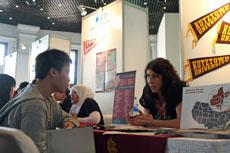
Nearly a year after the Obama administration set a priority of boosting higher education exchanges with Indonesia, the US is repeating its commitment to cultural diplomacy. As part of that outreach, it aims to double the number of Indonesian students studying in the US, a solution officials say will help the US economy and improve relations with the rapidly developing Muslim-majority nation.
Thousands of Indonesian students mill about the marble rotunda of the medieval-looking Sampoerna building, where recruiters from more than 50 American universities pass out information on entrance requirements, program offerings and tuition.
The education fair was part of a bilateral trade and education mission headed by visiting US Under Secretary of Commerce for International Trade Francisco Sanchez. He said educational exchanges can provided an added boost to the US economy.
"It's good to expose our students, to create long-term relationships, and it doesn't hurt the economy either, when people come and live in our country and study in our colleges and universities."
Last June, the Obama administration earmarked $165 million over five years to support university partnerships and student exchange programs in subjects such as agriculture, business and information technology.
The science arm of the Fulbright scholarship program will receive $15 million, while micro-scholarships will support intensive language training programs for both Americans and Indonesians.
The US is reaching out to fast-growing economies like Indonesia and Vietnam as new markets for US goods and services. International students injected nearly $19 billion into the US economy last year, and Indonesia's large population and rising middle class could open new opportunities for US universities to bring in more tuition dollars.
The US says it also wants to send more American students to Indonesia in the hope of improving understanding between the two countries. US Ambassador to Indonesia Scot Marciel said student exchanges create a personal basis for better relations.
But to entice more Indonesians to American schools, Marciel said the US has some homework to do. "We have to do a much better job of A, marketing our universities, which are the best in the world; and B, changing this terrible perception that you can't get a student visa. So I'm literally almost out on the streets grabbing people as they walk by saying, 'hey, we'll give you a visa if you go study in America.'"

Marciel said more than 90 percent of Indonesian applicants get visas to study in the United States, but many people from Muslim-majority countries, like Indonesia, still feel unwelcome because of obstacles put in place after the September 11, 2001 terror attacks.
The number of Indonesians studying in the US has fallen steadily since 1998, when the Asian financial crisis sapped some families' abilities to send children abroad. Visa issues depressed the numbers, which still have not rebounded. Fewer than 7,000 Indonesians studied in the United States last year, down about eight percent from 2009.
With improvements in universities elsewhere, as well as cheaper options closer to home, more Indonesians are choosing to study in Australia, Singapore and Malaysia.
But the US is still home to many of the world's most prestigious universities and research institutions. Many Indonesians who have studied abroad say the combination of strong academics and unique life experience is invaluable.
Erfan Lumban-Gaol, a former high school exchange student and recent graduate of Arkansas University, explains. "The seven years I was out there, I believe I've changed a lot in a lot of ways. In a lot of thinking ways, and I take a lot of positives from American culture."
Lumban-Gaol studied management, a popular major among Indonesians. While English is still a favorite subject, many students also are choosing business and science, hoping their American experience can assist them in setting up their own businesses in a country where entrepreneurs are rare.
One student at the educational fair said she wants to apply the lessons she would learn in the United States to creating new leadership for her country. That fits well with a goal expressed by US officials, who say American security is linked to Indonesia's success.
For Education Minister Mohammad Nur, the exchange is a part of enhanced cultural diplomacy that will help develop Indonesia and strengthen bilateral friendships.
There is a lot of history behind Indonesia's relationship with America, he said. That is why it needs to be strengthened. But Indonesia also wants to strengthen ties with Europe and other countries that can give it new insights.
At the education fair, some students said it does not matter which country they study in, as long as they can afford it. Others said they want to experience life in the United States, as long as there are good scholarship opportunities.
Students' woes come as windfall to overseas agents
Want to be a foreign exchange student?
Number of foreign students in US hits new high
High school exchange students in US share their thoughts
(來源:VOA 編輯:崔旭燕)
